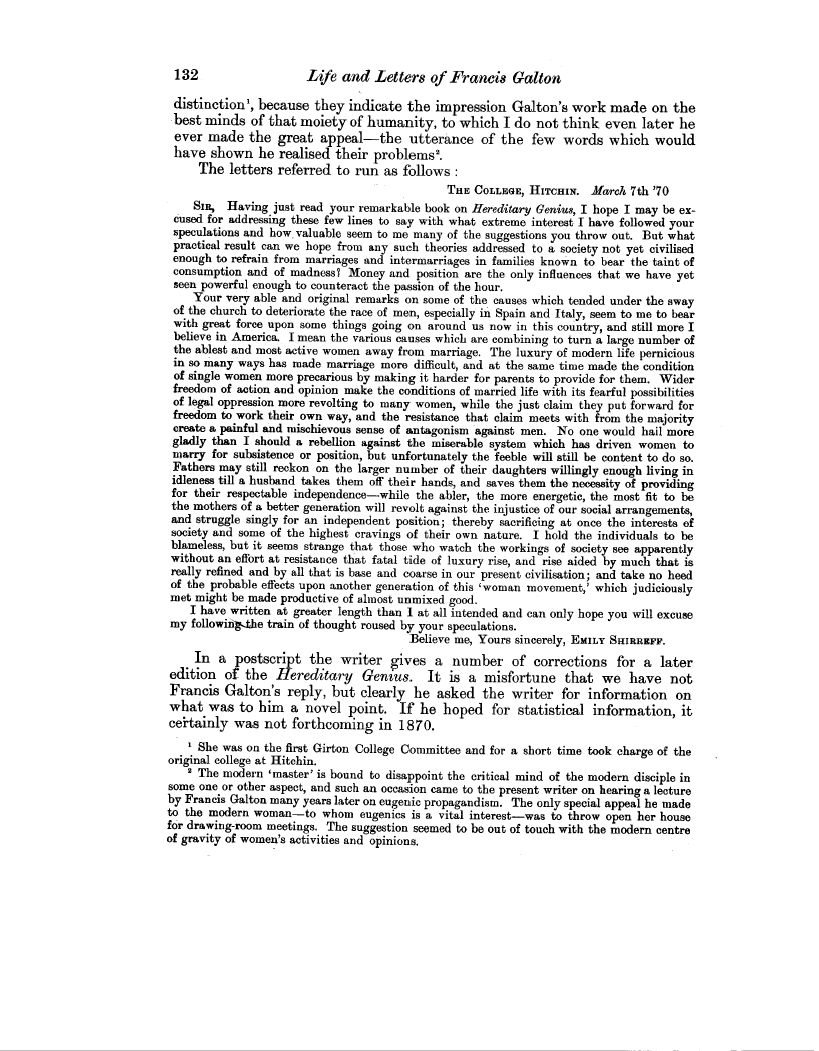132 Life and Letters of Francis Galton
distinction', because they indicate the impression Galton's work made on the best minds of that moiety of humanity, to which I do not think even later he ever made the great appeal-the utterance of the few words which would have shown he realised their problems 2.
The letters referred to run as follows
THE COLLEGE, HITCHIN. March 7th '70
SIR, Having just read your remarkable book on Hereditary Genius, I hope I may be excused for addressing these few lines to say with what extreme interest I have followed your speculations and how, valuable seem to me many of the suggestions you throw out. But what practical result can we hope from any such theories addressed to a society not yet civilised enough to refrain from marriages and. intermarriages in families known to bear the taint of consumption and of madness? Money and position are the only influences that we have yet seen powerful enough to counteract the passion of the hour.
Your very able and original remarks on some of the causes which tended under the sway of the church to deteriorate the race of men, especially in Spain and Italy, seem to me to bear with great force upon some things going on around us now in this country, and still more I believe in America. I mean the various causes which are combining to turn a large number of the ablest and most active women away from marriage. The luxury of modern life pernicious in so many ways has made marriage more difficult, and at the same time made the condition of single women more precarious by making it harder for parents to provide for them. Wider freedom of action and opinion make the conditions of married life with its fearful possibilities of legal oppression more revolting to many women, while the just claim they put forward for freedom to work their own way, and the resistance that claim meets with from the majority create a painful and mischievous sense of antagonism against men. No one would hail more gladly than I should a rebellion against the miserable system which has driven women to marry for subsistence or position, but unfortunately the feeble will still be content to do so. Fathers may still reckon on the larger number of their daughters willingly enough living in idleness till a husband takes them off their hands, and saves them the necessity of providing for their respectable independence-while the abler, the more energetic, the most fit to be the mothers of a better generation will revolt against the injustice of our social arrangements, and struggle singly for an independent position; thereby sacrificing at once the interests of society and some of the highest cravings of their own nature. I hold the individuals to be blameless, but it seems strange that those who watch the workings of society see apparently without an eflbrt at resistance that fatal tide of luxury rise, and rise aided by much that is really refined and by all that is base and coarse in our present civilisation; and take no heed of the probable effects upon another generation of this 'woman movement,' which judiciously met might be made productive of almost unmixed good.
I have written at greater length than I at all intended and can only hope you will excuse my following.the train of thought roused by your speculations.
Believe me, Yours sincerely, EMILY SHIRREFF.
In a postscript the writer gives a number of corrections for a later edition of the Hereditary Genius. It is a misfortune that we have not Francis Galton's reply, but clearly he asked the writer for information on what was to him a novel point. If he hoped for statistical information, it certainly was not forthcoming in 1870.
1 She was on the first Girton College Committee and for a short time took charge of the original college at Hitchin.
2 The modern 'master' is bound to disappoint the critical mind of the modern disciple in some one or other aspect, and such an occasion came to the present writer on hearing a lecture by Francis Galton many years later on eugenic propagandism. The only special appeal he made to the modern woman-to whom eugenics is a vital interest-was to throw open her house for drawing-room meetings. The suggestion seemed to be out of touch with the modern centre of gravity of women's activities and opinions.

